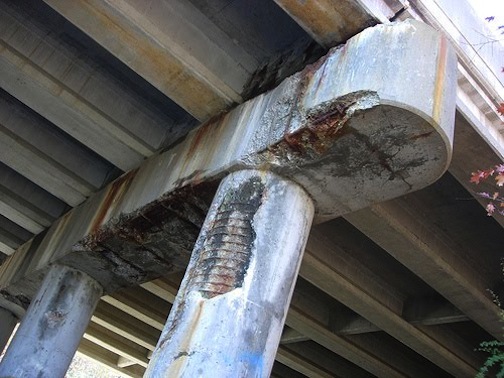Look Out for 100,000 Pounds of Cheese on U.S. Highways
Posted on Dec 13, 2016 in Safety | 1 comment

Can U.S. bridges handle 100,000-pound trucks?
Cheese doesn’t often make it into the headlines on these pages. However, this cheese is different, because it has plans to hit the country’s highways. If that happens, “The entire country’s motoring public will be put in grave danger.”
Those are the words of John Lannen, executive director of The Truck Safety Coalition as quoted by Bloomberg.
If they seem like extreme words to use in reference to cheese, consider that, according to the same Bloomberg story, Kraft Foods says it needs to pack its trucks full of 97,000 pounds of the processed sandwich slices in order to combat high diesel prices. Here’s the rub, though: Interstate highways have an 80,000-pound weight limit.
If the cheese gets an exception, so will everything else. In addition to the increased safety risk of hauling so much weight, our crumbling roadways (and bridges) just can’t handle the extra load.
There are 69,223 bridges in the U.S. that are classified as “structurally deficient.” That means they require significant maintenance, rehabilitation or replacement.
Still, Kraft, Home Depot, MillerCoors and others want the weight restriction increased so they can saddle those crumbling bridges with up to 100,000 pounds.
Kraft says it would need to drive 33 million fewer miles per year if the weight restriction were increased. Congress just extended a one-year pilot program to allow 100,000-pound trucks on interstates in Maine and Vermont for an additional 20 years, and a new bill would let every state decide whether they will allow the heavier trucks on their interstate highways.
Ironically, advocates of the plan call it the “Safe and Efficient Transportation Act” and say the proposal is an economic necessity. Conversely, civil engineers say the country’s bridges would have a lower factor of safety and wear out even faster. Many of the nation’s interstate bridges were designed for only 80,000-pound trucks, and that’s when they were new and perfectly sound.
Increased weight also means increased risk for highway fatalities. Though highway deaths have been on the decline, commercial-truck-related deaths were up last year, according to the Bloomberg report. Increasing the weight limit will only lead to the grave danger John Lannen mentioned in the quote above.





.gif)


Just look to Michigan, which already has the highest truck weight limits in the country, and not surprisingly, the worst roads in the country. I think it’s perfectly OK to let the big box shippers put heavier trucks on the road, as long as they are willing to pay the billions of dollars to repair the extra damage to the roads and bridges. They sure aren’t willing here in Michigan, and every pitch to screw the public for more money strangely never mentions these overweight trucks. To give you an idea what they want, I routinely see trucks around here that are so heavy they can hardly get moving.